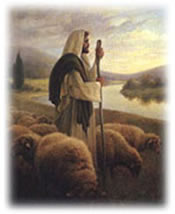
The Parable of the Good Shepherd
To leave the 99 in favor of the “one” is to understand our universal kinship with all human beings. It is to understand that our salvation and liberation are intertwined in a profound way with the salvation and liberation of the “stray ones,” the poor, the ostracized, those left in the bleak margins of society. When we hear in this parable the preferential delight that the Shepherd-God takes in this one lost sheep, we come to know the mysterious, boundary-shattering truth that the poor, the marginalized, those left behind without hope are the Beloved of God. Jesus tells us this quite plainly, “It is not the will of your Abba-God that one of these little ones should be lost.”
When we listen deeply to this parable of the lost sheep we are swept up into a decision about the depths of life’s meaning and our own patterns of living. We, as human beings, are not “hard-wired” to grasp who God is. God is utterly unknowable and lies well beyond any available categories in our minds to explain. All major religions agree on this point.
And yet, in the Christian faith, God can be known in human terms because God came into this world as a human - “and thus can be known about in the familiar language of earthly experience. Jesus did not live a parallel existence alongside of the world, instead he plunged into our world to transform it by His mission.”
Thus, in Jesus, we can know that the unutterably mysterious God, “whose explosive power hurls galaxies into space is the same God whose tender love enfolds the disinherited, the dispossessed, the ‘throw-aways’ of the earth.” No parable expresses this radical, even disconcerting, truth more clearly and unequivocally than the parable of the Good Shepherd.
When we speak about spirituality or a spiritual path, we are talking about the moment when we gain an insight into the nature of reality and then begin to love that reality. Over a lifetime, it is, as Annie Dillard tells us, “the heart’s hard turning, the heart’s slow learning” how to love and who to love.
While we are not “wired” to grasp who God is, what we are hard-wired for is openness to mystery. We are created with a gnawing “incompleteness, an unfinishedness, an emptiness” at the core of the self. We are radically open to mystery and are driven there by our thirst for something more, something beyond our “ego encapsulated” selves. St. Augustine says, “we seek one Mystery, God, with another mystery, ourselves.”
The parables of Jesus give us an opening on the mystery of God by shattering our hardened perceptions of reality and flipping them upside down. The parables give elbowroom to God whose compassion is always a surprise, always an imaginative shock.
The parable of the Good Shepherd cuts quite quickly to the ‘spiritual marrow.’ It is only five sentences long. The theme of this parable of the lost sheep, like the lost coin and the lost treasure, is about “homecoming,” about overcoming our lostness. It is about finding and being found, about finding God and being found by God. It is the spiritually stunning news that God, through Jesus has caused our “homecoming.” This parable is about our reconciliation with holy mystery, with the sacred.
When we begin to accept this “homecoming” there are two dimensions to our liberation, to our “heart’s hard turning” personal conversion and social transformation. A turning toward God as a rudder in life and a turning towards others in compassionate service. A deep relationship with God always extroverts us for service to others.
Jesus draws us into “the heart’s slow learning” who to love and how to love when he asks: “What do you think? Suppose a man has a hundred sheep. If one of them strays, does he not leave the other ninety-nine on the hillside and go in search of the one that strayed?” Here he reverses our expectations. Using the ‘tawdry materialism’ of our day we might draw the opposite conclusion. Why leave the 99? This parable shocks us by cutting through “our perennial inclination to draw lines, invoke boundaries, establish hierarchies, maintain discrimination.” The gospel breaks down all barriers. “Conversion of hearts is the great equalizer.”
To leave the 99 in favor of the “one” is to understand our universal kinship with all human beings. It is to understand that our salvation and liberation are intertwined in a profound way with the salvation and liberation of the “stray ones,” the poor, the ostracized, those left in the bleak margins of society. When we hear in this parable the preferential delight that the Shepherd-God takes in this one lost sheep, we come to know the mysterious, boundary-shattering truth that the poor, the marginalized, those left behind without hope are the Beloved of God. Jesus tells us this quite plainly, “It is not the will of your Abba-God that one of these little ones should be lost.”
When we listen deeply to this parable of the lost sheep we are swept up into a decision about the depths of life’s meaning and our own patterns of living.
This parable is an invitation to participate in God’s project for humanity which we call the reign of God. The reign of God is that space in our hearts and on the earth where conversion has taken place - where the “heart’s hard turning, the heart’s slow learning” how to love and who to love has unleashed the most potent energy in the universe - God’s love loose upon the earth.
— Sr. Helene Hayes, apostolic sister
